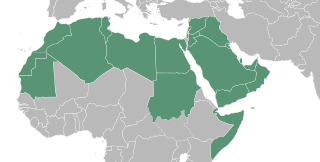
The Turks in the Arab world refers to ethnic Turkish people who live in the Arab world. There are significant Turkish populations scattered throughout North Africa, the Levant, and the Arabian Peninsula.
In Libya, some groups identify themselves as Turkish, or descendants of Turkish soldiers who settled in the area in the days of the Ottoman Empire[1] There is also a significant Turkish minority in Egypt.[2]
In the Levant, the Turks live across the region. In Iraq and Syria the Turkish minorities are commonly referred to as "Turkmen", "Turkman" and "Turcoman"; historically, these terms have been used to designate Turkish speakers in Arab areas, or Sunni Muslims in Shitte areas.[3] The majority of Iraqi Turkmen and Syrian Turkmen are the descendants of Ottoman Turkish settlers.[4][5][6][7] and share close cultural and linguistic ties with Turkey, particularly the Anatolian region.[8][7] There are also Turkish minorities located in Jordan and in Lebanon. The Lebanese Turks live mainly in the villages of Aydamun and Kouachra in the Akkar District, as well as in Baalbek, Beirut, and Tripoli.
In the Arabian Peninsula, there are Turkish minorities who have lived in the region since the Ottoman era. The Turks live predominately in Saudi Arabia and in Yemen.
- ^ Malcolm, Peter; Losleben, Elizabeth (2004), Libya, Marshall Cavendish, p. 62,
There are some Libyans who think of themselves as Turkish, or descendants of Turkish soldiers who settled in the area in the days of the Ottoman Empire.
- ^ Nkrumah, Gamal (2016). "Did the Turks sweeten Egypt's kitty?". Al-Ahram Weekly. Retrieved 2016-10-30.
Today, the number of ethnic Turks in Egypt varies considerably, with estimates ranging from 100,000 to 1,500,000. Most have intermingled in Egyptian society and are almost indistinguishable from non-Turkish Egyptians, even though a considerable number of Egyptians of Turkish origin are bilingual.
- ^ Peyrouse, Sebastien (2015), Turkmenistan: Strategies of Power, Dilemmas of Development, Routledge, p. 62, ISBN 978-0230115521
- ^ Taylor, Scott (2004), Among the Others: Encounters with the Forgotten Turkmen of Iraq, Esprit de Corps, p. 31, ISBN 1-895896-26-6,
The largest number of Turkmen immigrants followed the army of Sultan Suleiman the Magnificent when he conquered all of Iraq in 1535. Throughout their reign, the Ottomans encouraged the settlement of immigrant Turkmen along the loosely formed boundary that divided Arab and Kurdish settlements in northern Iraq.
- ^ Jawhar 2010: "There’s a strong conflict of opinions regarding the origins of Iraqi Turkmen, however, it is certain that they settled down during the Ottoman rule in the northwest of Mosul, whence they spread to eastern Baghdad. Once there, they became high ranked officers, experts, traders, and executives in residential agglomerations lined up along the vast, fertile plains, and mingled with Kurds, Assyrians, Arabs, and other confessions. With the creation of the new Iraqi state in 1921, Iraqi Turkmen managed to maintain their socioeconomic status."
- ^ International Crisis Group 2008, p. 55, L: "Turkomans are descendents of Ottoman Empire-era soldiers, traders and civil servants... The 1957 census, Iraq’s last reliable count before the overthrow of the monarchy in 1958, put the country’s population at 6,300,000 and the Turkoman population at 567,000, about 9 per cent...Subsequent censuses, in 1967, 1977, 1987 and 1997, are all considered highly problematic, due to suspicions of regime manipulation."
- ^ a b The New York Times (2015). "Who Are the Turkmens of Syria?".
In the context of Syria, though, the term ["Turkmen"] is used somewhat differently, to refer mainly to people of Turkish heritage whose families migrated to Syria from Anatolia during the centuries of the Ottoman period — and thus would be closer kin to the Turks of Turkey than to the Turkmens of Central Asia...Q. How many are there? A. No reliable figures are available, and estimates on the number of Turkmens in Syria and nearby countries vary widely, from the hundreds of thousands up to 3 million or more.
- ^ BBC (June 18, 2004). "Who's who in Iraq: Turkmen". Retrieved 2011-11-23.
The predominantly Muslim Turkmen are an ethnic group with close cultural and linguistic ties to Anatolia in Turkey.